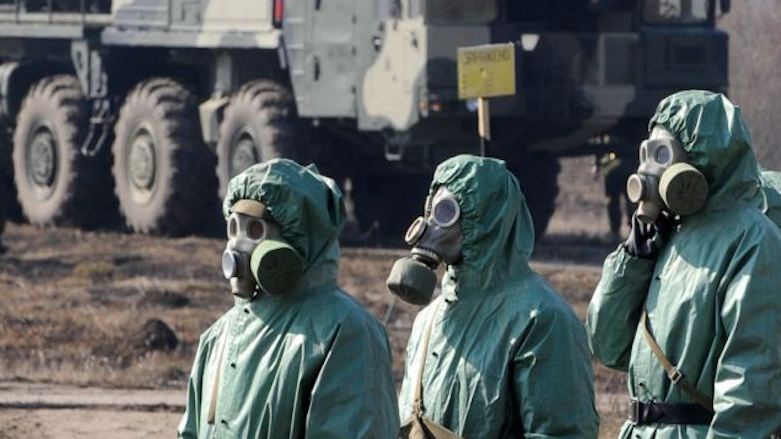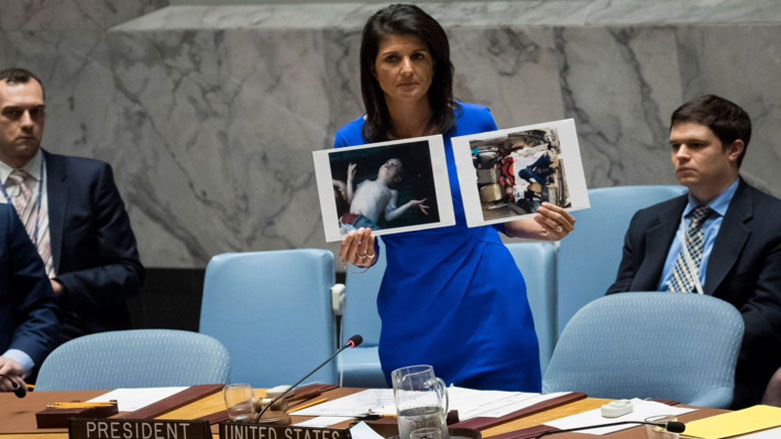OPCW ties Syrian regime to biggest sarin attack

WASHINGTON DC, United States (Kurdistan 24) – The Organization for the Prohibition of Chemical Weapons (OPCW) has concluded that the regime of Bashar al-Assad was responsible for the most lethal chemical attack in Syria’s eight-year-long civil war, Reuters reported on Tuesday.
On Aug. 21, 2013, hundreds of people died from sarin gas dropped on Ghouta, a suburb of Damascus. The attack prompted US President Barack Obama to threaten a US retaliatory strike on Syria.
However, Moscow intervened, volunteering to ensure the destruction of Syria’s chemical weapons stockpile and its chemical precursors, a task undertaken in 2014 by the OPCW (it subsequently became evident that the operation had been incomplete and Syria retained a chemical weapons capability).
The Syrian regime, and its Russian ally, have long maintained that the Syrian opposition was behind the Ghouta attack.
Yet, based on its earlier work, the OPCW has been able to determine definitively that Damascus was behind the assault. It has succeeded in linking that attack, as well as the March 2013 chemical assault on Khan al-Assal in Aleppo Province, and the April 2017 attack on Khan Shaykhun in Idlib Province, to Syria’s chemical stockpile.
Based in the Netherlands, the OPCW is an inter-governmental organization, with a membership that includes 192 states. It has been working with the UN to investigate the chemical attacks in Syria during the country’s eight-year-long civil war.
When the town of Khan Shaykhun was attacked with sarin gas last year, killing over 80 people and injuring hundreds more, Washington responded by launching cruise missiles on the Syrian air base from which the planes responsible for dropping the chemical munitions had flown.
The OPCW compared samples taken by a UN mission in Ghouta following the sarin attack with chemicals it received from Syria in 2014, and it has now concluded that “markers” in the samples show that the regime was, indeed, behind the Ghouta attack.
The OPCW has also determined that Damascus was responsible for the chemical attacks in Khan Shaykhun and Khan al-Assal.
Brutal conflict continues to this day in Ghouta, where many residents have taken to living underground.
In mid-January, a suspected chlorine gas attack occurred. However, chlorine gas is not formally considered a chemical weapon. It has industrial uses and is less lethal than internationally-recognized chemical weapons.
Civilians in western countries have had virtually no exposure to chemical agents. However, terrorist attacks using such weapons are a danger.
The apocalyptic Japanese cult, Aum Shinrikyo, attempted to carry out a sarin gas attack on the Tokyo subway in 1995, killing 13 people. If a more sophisticated entity had been involved, however, the assault could have been deadlier.
In 2016, the German government, concerned about a possible chemical or biological attack from the Islamic State (IS), issued new guidelines for civil defense procedures.
On Monday, Kirstjen Nielsen, head of the US Department of Homeland Security, warned that IS “has used chemical weapons on the battlefield in Syria and Iraq,” and “it is only a matter of time” before they try to conduct such “attacks in the West.”
Editing by Karzan Sulaivany

